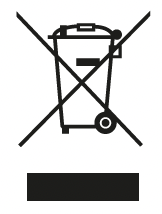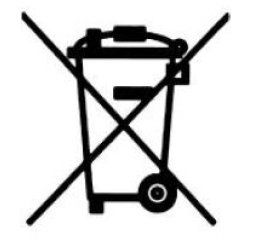Information according to the
Electrical and Electronic Equipment Act
and the Battery Act
1. Obligation to dispose of electrical and electronic equipment
You must dispose of electrical and electronic equipment marked with the "crossed-out wheeled bin" symbol separately from unsorted municipal waste and separate spent batteries and accumulators that are not enclosed in the waste equipment, as well as lamps that can be removed from the waste equipment without damaging it, from the waste equipment without damaging it before handing it over at a collection point. However, the obligation to separate does not apply if the WEEE is handed over to a primary treatment facility and a public waste management authority under Article 17b ElektroG for the purpose of preparation for re-use or if a public waste management authority responsible for the recovery and disposal of WEEE under Land law exempts all WEEE in the group from being made available for collection for at least two years at a time (opting out) and separates the WEEE in order to prepare it for re-use.
2. possibility of returning and disposing of WEEE
The electronic equipment is labelled in accordance with Directive 2002/96/EC on waste electrical and electronic equipment (WEEE). At the end of their life, electronic equipment must not be disposed of in the residual waste bin, but must be handed in at a collection point for the recycling of electronic equipment. This also applies to electrical appliances that were last used in a non-private sector, but e.g. in trade or craft. If the acceptance of non-privately used electrical appliances has been excluded by the responsible local public waste disposal facilities, their waste advice centre will provide information on environmentally sound disposal. The symbol on the product, the operating instructions or the packaging indicates this. Translated with www.DeepL.com/Translator (free version)

The materials are recyclable according to their labelling. The reuse, recycling or other forms of recovery of old equipment makes an important contribution to the protection of the environment.
3. Data protection
We would like to point out to all end-users of WEEE that you are responsible for deleting personal data from the WEEE to be disposed of.
4. WEEE registration number
Under the registration number DE 34799854 we are registered at the Stiftung Elektro-Altgeräte Register, Nordostpark 72, 90411 Nürnberg, as a producer of electrical and/or electronic equipment.
5. collection and recycling quotas According to the WEEE Directive, the EU member states are obliged to collect data on WEEE and to transmit them to the European Commission. You can find more information on this on the BMUV website.
Information according to § 18 Battery Act
As batteries and rechargeable batteries may be contained in our consignments, we are obliged under the Battery Act (BattG) to inform you of the following:

Batteries and rechargeable batteries must not be disposed of in household waste. You are legally obliged to return used batteries and rechargeable batteries. Used batteries may contain harmful substances that can damage the environment or your health if not stored or disposed of properly. However, batteries also contain important raw materials such as iron, zinc, manganese or nickel and can be recycled. You can either return the batteries to us after use or return them free of charge in the immediate vicinity (e.g. to retailers or municipal collection points or to our dispatch warehouse). The return of batteries to sales outlets is limited to the quantities customary for end users and to those spent batteries that the distributor carries or has carried in its product range as new batteries. The symbol with the crossed-out dustbin means that batteries and accumulators must not be disposed of with household waste. Under this symbol you will also find the following symbols with the following meaning:
Pb: Battery contains lead
Cd: Battery contains cadmium
Hg: Battery contains mercury
Information requirements according to §18 Para. 2 Electrical and Electronic Equipment Act

